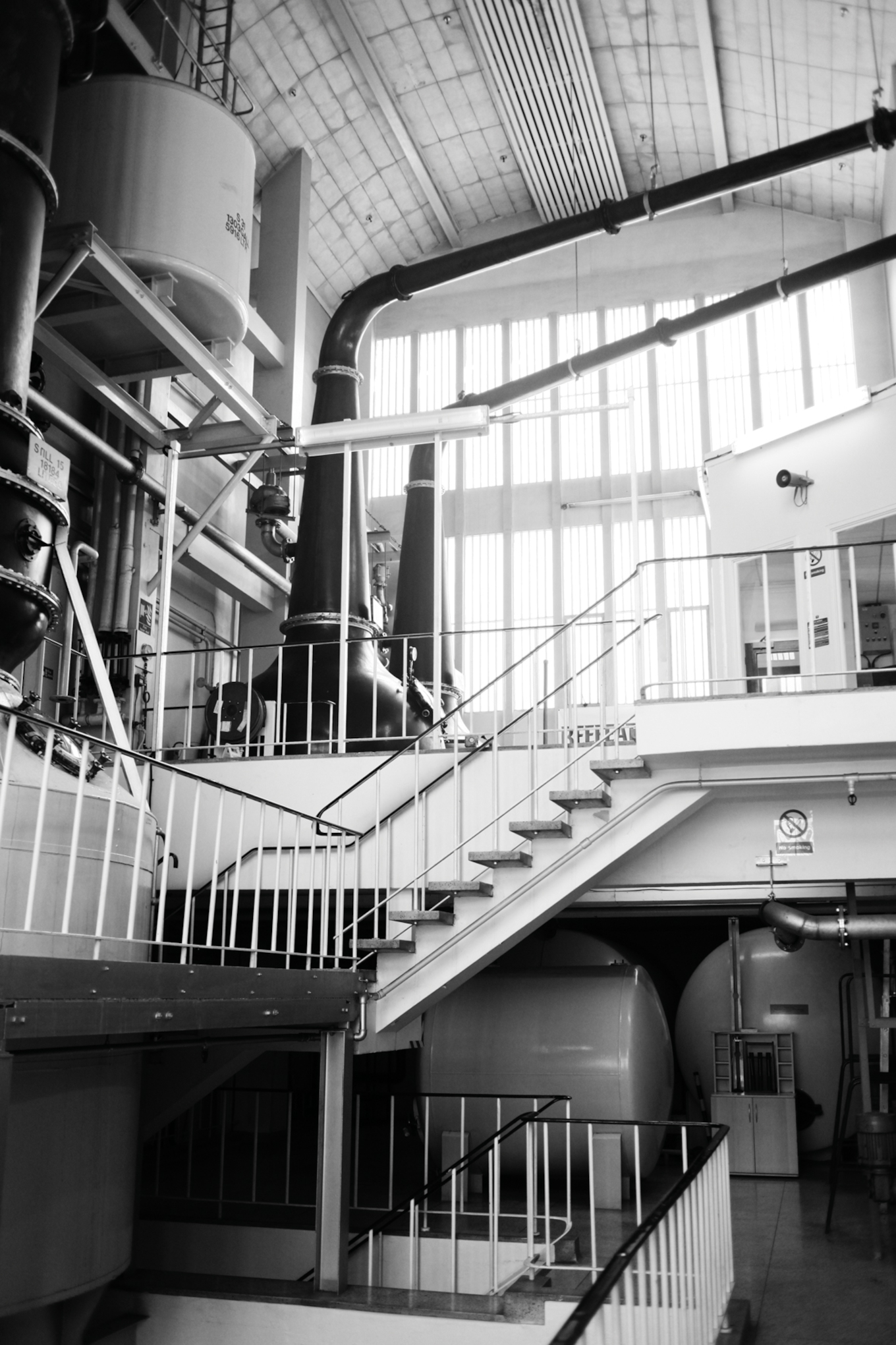Are you a Discerning Drinker?
Join thousands of like-minded professionals and cocktail enthusiasts, receive our weekly newsletters and see pages produced by our community for fellow Discerning Drinkers.

Crafting Beefeater Gin
As well as juniper from Tuscany, Beefeater Gin is flavoured with coriander seeds, liquorice, orris root, Seville orange peel, Spanish lemon peel, Spanish bitter almonds, angelica root and seeds. These are steeped in wheat-neutral grain spirit for a minimum of 24 hours before steam heat is gently applied to the base of the pot still to start a distillation process that takes over seven hours.
In the early 1990s, the brand leader and other competitor gins lowered their strength in the UK to the then newly permissible level of 37.5% alc./vol.. Beefeater defiantly held its strength at 40% alc./vol. and, to its credit, retains that strength to this day.
 In 1993, Crown Jewel, an "ultra-premium" Beefeater expression was created especially for the travel retail market, and thanks to its popularity has gone on to become a permanent edition. Bottled at 50% alc./vol., Crown Jewel is made with the same nine botanicals, in the same proportions, as Original Beefeater but with the addition of dried grapefruit peel as a tenth botanical. Original Beefeater has a distinctive orange zestiness but in Crown Jewel this is subdued by the grapefruit to create a brilliantly balanced gin.
In 1993, Crown Jewel, an "ultra-premium" Beefeater expression was created especially for the travel retail market, and thanks to its popularity has gone on to become a permanent edition. Bottled at 50% alc./vol., Crown Jewel is made with the same nine botanicals, in the same proportions, as Original Beefeater but with the addition of dried grapefruit peel as a tenth botanical. Original Beefeater has a distinctive orange zestiness but in Crown Jewel this is subdued by the grapefruit to create a brilliantly balanced gin.
Desmond Payne started as a distiller in 1968 at the long-since-closed Seager Distillery in London's Deptford, then moved to Plymouth Distillery before taking over as Master Distillery at Beefeater in 1995. In 2018, his 50 years of distilling and contribution to the gin industry was recognised in the Queen's New Year's Honours List when he was awarded an MBE. It is no exaggeration to say he is the world's most experienced Master Gin Distiller but until 2008 he had never been given the opportunity to create his own gin. Finally given free rein to formulate his own gin the result is Beefeater 24with tea as its defining botanical.
 The inspiration for a radical botanical in his new gin came from previous visits to Korea and Japan where Desmond had discovered that due to restrictions on the use of quinine, the locally made tonic water was not a patch on what he was used to drinking with Beefeater back home. As a result, their G&Ts lacked bite so he had been forced to look for alternative mixers. He enjoyed drinking the ubiquitous local canned iced teas so tried mixing this with his gin. The result was very acceptable and so 'Beefeater and iced tea' became his default drink in Asia.
The inspiration for a radical botanical in his new gin came from previous visits to Korea and Japan where Desmond had discovered that due to restrictions on the use of quinine, the locally made tonic water was not a patch on what he was used to drinking with Beefeater back home. As a result, their G&Ts lacked bite so he had been forced to look for alternative mixers. He enjoyed drinking the ubiquitous local canned iced teas so tried mixing this with his gin. The result was very acceptable and so 'Beefeater and iced tea' became his default drink in Asia.
Remembering this and the fact that tea is traded like a botanical it seemed logical to Desmond to experiment with tea in his new gin. Initially, he simply took leaf tea and distilled it in alcohol using his 2-litre laboratory still. As a result, he discovered that both Assam and Darjeeling teas were far too tannic but green tea had the required fragrance and aroma, in particular Chinese green tea.
Having already decided on tea based solely on the suitability of its flavour profile in gin, research later revealed that James Burrough's father, William, had been a tea merchant by Royal Appointment to Queen Victoria as part of his grocery business in Ottery St. Mary in Devon.
Beefeater Crown Jewel, the brand's super-premium gin is known for its use of grapefruit so it seemed logical to combine this with botanicals from the original Beefeater recipe and the Chinese green tea. He knew from experience that all these botanicals would combine well but the challenge was to balance the flavours. Angelica's musky, nutty notes were the nearest to the green tea in the Beefeater's original recipe so Desmond cut this back slightly. He also reduced the amount of orange and lemon peel to counterbalance the addition of the grapefruit.
The result of his experimentations was a prototype with the working title 'Big Ben' and this was blind tested by panels in London and New York against six leading gin brands, both neat, in G&Ts, Dry Martinis and Collins'. The feedback was very positive but when the test groups had been told the new gin contained tea, the prototype was so well balanced that they were unable to detect it. It was decided that the tea influence should be increased.
Now tutored in the art of tea tasting, Desmond went back to his tea merchant and tried Japanese Sencha Tea, harvested from the slopes of Mt Fuji. Unusually this rare and expensive tea is steamed to prevent the oxidisation that occurs with other teas and consequently is packed in 200-gram foil bags to keep it fresh - even when ordering in the quantities required for distilling. This added an extra fragrant grassy dimension to the gin.
 Believing he had now found the perfect recipe using twelve botanicals, Desmond worked to perfect the steeping and distillation process. He had worried that the full 24-hour steeping process used for Beefeater Original might stew the tea but instead found it beneficial. He did, however, find that the tannins from the tea came over towards the end of the distillation so his 'cut' into the tail of the run for Beefeater 24 is much earlier than is usual. This limits the quantity of gin produced in each run but retains the gin's fresh notes of grapefruit and leaf teas. Desmond believes this to be the earliest cut used in the gin industry and it results in close to a third of each distillation being discarded as feints.
Believing he had now found the perfect recipe using twelve botanicals, Desmond worked to perfect the steeping and distillation process. He had worried that the full 24-hour steeping process used for Beefeater Original might stew the tea but instead found it beneficial. He did, however, find that the tannins from the tea came over towards the end of the distillation so his 'cut' into the tail of the run for Beefeater 24 is much earlier than is usual. This limits the quantity of gin produced in each run but retains the gin's fresh notes of grapefruit and leaf teas. Desmond believes this to be the earliest cut used in the gin industry and it results in close to a third of each distillation being discarded as feints.
Full-scale distillations proved successful and the now production-ready gin was named Beefeater 24 after Beefeater's overnight steeping process. The Royal Doulton factory next door to the old Lambeth distillery proved the inspiration for the new gin's bottle design. The ceramics factory was one of the champions of the Arts and Crafts movement and naturally, being neighbours, the Burroughs commissioned Royal Doulton decanters in which to bottle some of their liqueurs. Although these were not directly copied, their design style is very apparent in Beefeater 24's bottle.




Beefeater Gin Distillery
Established: 1820
Visitor Policy: Visitors welcome throughout the year
Tel: +44 (0)20 7587 0034
Website: Beefeater Gin Distillery
Address: 20 Montford Place, Kennington, London, SE11 5DE

Beefeater London Dry Gin
Named after the Yeoman Warders Who've guarded the Tower of London since appointed as personal bodyguards by King Henry VIII in 1485, they remain the Queens's

Beefeater Crown Jewel
Originally launched in 1993 and aimed at the travel retail market, this premium Beefeater expression is named after the Crown Jewels displayed at the Tower

Beefeater 24 Gin
Flavoured with 12 botanicals including rare teas, Beefeater 24 takes its name from the 24-hour period the botanicals are steeped in alcohol prior to distillation.

Beefeater Burrough's Reserve
Launched June 2013, Burrough's Reserve is distilled in a small 19th Century copper pot still and then rested in oak casks for a period prior to bottling.





